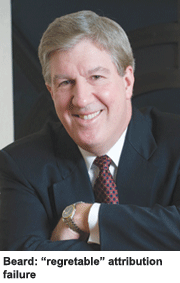An international exam board head caught plagiarising in a public speech has written to schools worldwide explaining his embarrassing “oversight”. The Times Educational Supplement revealed on September 17 that Jeffrey Beard, director general of the Geneva-based International Baccalaureate Organisation (IBO), was exposed by a US academic institution for passing another educationist’s work off as his own. In October Beard sent a letter to heads of schools that offer the IB curricula, giving his side of what he describes as an “unfortunate incident”.
The Chautauga Institution in New York state withdrew Beard’s speech from its website and bookshop after discovering that it “was not original work”. A day after the speech was delivered, Chautauga expressed its “disapp-ointment”, revealing that Beard “drew heavily upon and quoted extensively from a speech given earlier in the year by Sir Ken Robinson”, a renowned British educationist.
 In his letter to the heads of 3,086 IB-affiliated schools worldwide, Beard says he has written to Tom Becker, Chautauga president, who, he claims, had “subsequently accepted my explanation”. But a Chautauga spokesman says Becker had not replied to the letter and had gone no further than accepting Beard’s apology.
In his letter to the heads of 3,086 IB-affiliated schools worldwide, Beard says he has written to Tom Becker, Chautauga president, who, he claims, had “subsequently accepted my explanation”. But a Chautauga spokesman says Becker had not replied to the letter and had gone no further than accepting Beard’s apology.
Beard’s letter explains that he was “working off note cards” during his Chautauga speech and failed to mention all the references he was using. In his defence he quotes Nicholas Tate, chair of the IB education committee, who described the failure to cite Sir Ken as “regrettable”. But Dr. Tate, a former head of Winchester School and former Qualification and Curriculum Authority chief executive, adds: “There are different standards and customs that apply to scholarly papers, examination answers and wide-ranging talks at conferences. It is just not sensible to apply the rules covering the first two situations to the third.”
Meanwhile the reputation of IBO took another hit when in November one of its confidential mark schemes, which provide examiners with model answers to help them grade papers, for a history paper had plagiarised large chunks from Wikipedia. An IB examiner who spoke to TES said they were “shocked” to discover there were “serious examples of academic dishonesty” throughout the document with guides for 14 of the 24 questions containing large sections copied wholesale from unattributed websites, including Wikipedia. She added that a pupil who copied their exam answers or coursework from Wikipedia would be found guilty of malpractice and would not receive a grade.
The examiners who uncovered the marking guide plagiarism said they were “embarrassed” for the IBO. “It will be difficult for me to insist that my students practice academic honesty when the very organisation which creates examinations and then assesses them according to often uncited materials does not follow these same guidelines,” they said.
Comments Geoff Lucas, secretary of the Headmasters’ and Headmistresses’ Conference, which has more than 10 percent of its member schools using IB curricula: “One has to ask what the quality assurance system within the IBO is, to allow this to happen.”
Mary Bousted, general secretary of the Association of Teachers and Lecturers, says it is an example of the risks schools could face if they move away from England’s well regulated exams system.
(Excerpted and adapted from Times Education Supplement)